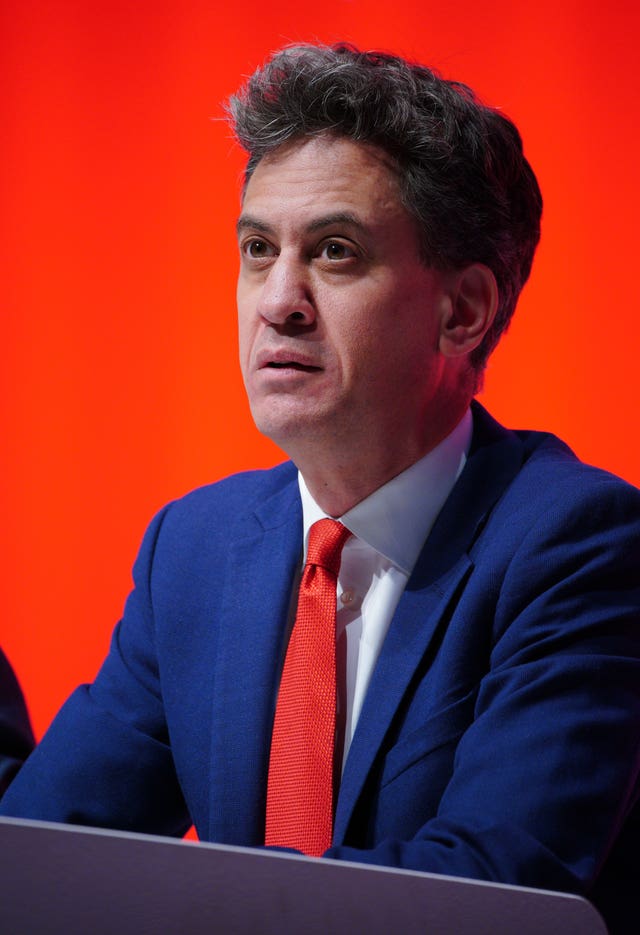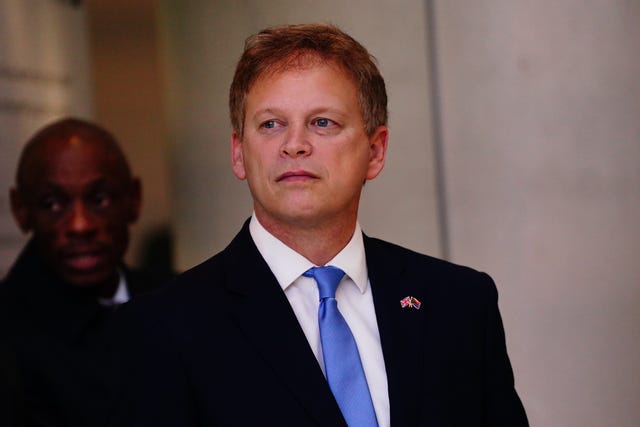Ed Miliband grills Grant Shapps over views on onshore windfarms
Earlier this week, Mr Shapps signaled the Government will reverse its ban on onshore wind farms in a bid to fend off a rebellion of Tory MPs.

Ed Miliband has urged Grant Shapps to clarify his position on onshore wind farms “once and for all”.
The shadow climate change secretary said he found it “extraordinary” that given the “chaos, confusion, and embarrassment” of the Government on onshore wind, Mr Shapps didn’t “clear it up” in the Commons.
He accused the Business Secretary of being part of a “fossilised tendency” and of making his predecessor, Jacob Rees-Mogg, look “positively on trend” on the issue.
Mr Miliband’s comments came as he responded to Mr Shapps’ statement on energy security in the lower chamber.
Earlier this week, Mr Shapps signalled the Government will reverse its ban on onshore wind farms in a bid to fend off a rebellion of Tory MPs, which include former prime ministers Boris Johnson and Liz Truss.
Simon Clarke, the ex-levelling up secretary heading the rebellion, said more than 30 Conservative MPs now support his amendment to the Levelling-up and Regeneration Bill.

In the Commons, Mr Miliband said: “I have to say to the Secretary of State given the chaos, confusion, and embarrassment of the Government on onshore wind, I find it extraordinary that he didn’t come to the House today to clear it up.
“The ban on onshore wind in England that they put in place in 2015 has raised bills for every family in this country by £150 each and keeping the ban in place up to 2030 would mean customers paying £16 billion more on bills compared to a target of doubling onshore wind.”
He stressed the only reason the issue is being debated is not because “the public don’t support it”, but because “dinosaurs on the benches opposite oppose clean energy”.
He went on: “The problem is that the Secretary of State (Grant Shapps) who prides himself on being a truly modern man is part of a fossilised tendency.”

“Because he, after all, called for the consenting regime for onshore wind to be brought into line with other infrastructure. So can the Secretary of State clear up once and for all what is his position on onshore wind?”
In his response, Mr Shapps argued wind turbines are now “so big” they have to be put offshore.
The Business Secretary said: “These turbines are now so large, they can’t even be constructed onshore. They are so big, the turbines wouldn’t be able to be carried by roads.
“They have to be put offshore. How big are they? Well, it’s actually convenient the World Cup is on, he will be able to envisage this.
“These single turbines are seven football pitches in scope as they turn. They’re not buildable onshore. It’s one of the reasons why the cheapest way to build them offshore, to produce energy offshore, is to build these mammoth turbines which go together in groups of two or even up to 300.
“I don’t know why this local consent principle is so difficult for the right honourable gentleman opposite to understand.”
Mr Miliband was not the only one to voice support for onshore wind in the Commons, with Tory MP for Calder Valley Craig Whittaker, a former Government whip, saying: “Land-based wind is actually a good, quick and relatively cheap way of the Government achieving more around alternative energy as well as securing supply.
“Will the minister therefore agree with me that the current partial ban on onshore wind is stifling growth, stifling our march for net-zero, and stifling our quest for security of supply?”
Mr Shapps reiterated a “mixed provision of energy is extremely important”, adding: “I have talked about solar and talked about offshore and onshore wind, nuclear and other sources, and the answer is very simple, it has been set out in our energy review in the 10-point plan and elsewhere that where there is local consent, we will ensure that onshore wind can be part of that critical mix.
“I think it is a fairly simple principle in fact that the whole House should be able to unite behind, that it should be the case that local consent is important for these things and that is the situation as it exists and will continue to.”





